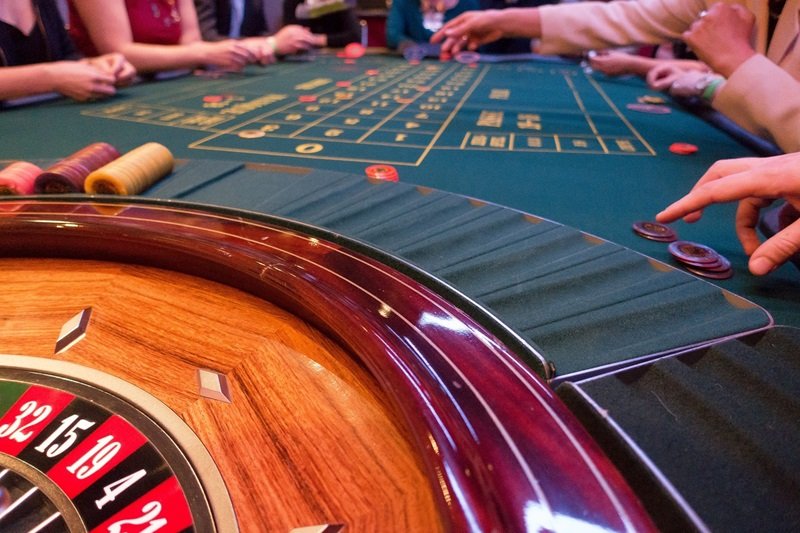Roulette is a widely popular gambling game full of adrenaline and excitement. Find out how French and American roulette differ, and when you have the best chances of winning.
Roulette

Roulette is an integral part of every casino, including online casinos (source: pixabay.com)
This game of chance is considered the queen of casino games. In the Czech Republic and worldwide, it enjoys great popularity, which is growing thanks to the possibility of playing it online. Anytime and anywhere, you can try your luck and see if you can beat the wheels of fate. Discover the rules of this exciting game and how the different variants differ so you can enjoy a truly unique experience and possibly the sweet feeling of victory.
Play roulette at 20BET online casino
History of roulette
The name of this game is derived from the French word roulette meaning small wheel. Its creator was probably the French physicist and mathematician Blaise Pascal, whose goal was to create a random number generator. Records show that roulette was first played in Paris in 1796 and later spread to neighboring European countries. Initially, the wheel contained only 36 segments. Today, however, you will find versions with 37 – 38 segments.
French and American roulette
In 1843, François and Louis Blanc expanded the basic numerical wheel with an additional segment. In addition to the black and red fields, there was now one green field with the number 0. This slight change increased the chances of winning in favor of the game operator. In the early 19th century in the USA, another green field was added with the numbers 00, which further increased the profits of casinos and gaming houses. These fields still distinguish the French and American versions of roulette today.
Russian roulette
This is a game of chance based on the idea of the original roulette, but its rules and course are much more drastic. In this case, the small wheel is replaced by the cylinder of a revolver, into which only one single bullet is placed. The cylinder is then spun, and the weapon is placed against the player’s temple and the trigger is pulled. In some versions, the cylinder is spun again when passed to the next player; in others, it is only spun at the beginning of the round. The probability of firing is thus 1:6.
Rules of roulette
Roulette is based on two wheels. The outer larger wheel is stationary and contains red and black fields with numbers from 1 to 36 and an additional green field with the number 0 or 00. Only the smaller inner wheel containing only colored fields rotates. The numbers are not arranged in a row but are placed to create various combinations of even and odd, large and small numbers. There are a total of 12 basic bets, several special bets, and various betting systems in this game of chance.
Basic bets in roulette
Players can bet on one specific number, with a payout ratio of 35:1. However, it is also possible to place combination bets on pairs, triplets, quartets, or six numbers. You can also bet on low numbers from 1 to 18 or high numbers from 19 to 36, odd and even numbers, red or black. These are called even-money bets and are paid at a ratio of 1:1. There are also bets on dozens, specifically on the first, second, and third or columns (including adjacent dozens and adjacent columns). In all cases, the payout ratio is 2:1. Along with the win, players also get back the amount they bet. Chips are usually color-coded to avoid confusion with other players. Throughout the game, players can freely combine individual bets and increase their chances of winning.
| Bet | Payout ratio |
| Single number | 35:1 |
| Pair | 17:1 |
| Trio | 11:1 |
| Quartet | 8:1 |
| Six numbers | 5:1 |
| First dozen | 2:1 |
| Adjacent dozens | 1:2 |
| Column | 2:1 |
| Adjacent columns | 1:2 |
| Red numbers | 1:1 |
| Black numbers | 1:1 |
| Odd numbers | 1:1 |
| Even numbers | 1:1 |
| Low numbers | 1:1 |
| High numbers | 1:1 |
Basic bets in Czech, English, French
| Czech | English | French | Payout ratio |
| Single number | Single number (Straight) | En plein | 35:1 |
| Pair | Two numbers (Split) | A cheval | 17:1 |
| Trio | Three numbers (Street) | Transversale pleine | 11:1 |
| Quartet | Four numbers (Square, Corner) | En carré | 8:1 |
| Six numbers | Six numbers (Line bet) | Sixtaine, Transversale simple | 5:1 |
| First dozen | Dozen (1st, 2nd, 3rd) | Douzaine (premiere, moyenne, derniere) | 2:1 |
| Adjacent dozens | Adjacent dozens | Douzaine à cheval | 1:2 |
| Column | Column | Colonne | 2:1 |
| Adjacent columns | Adjacent columns | Colonne à cheval | 1:2 |
| Red numbers | Red | Rouge | 1:1 |
| Black numbers | Black | Noire | 1:1 |
| Odd numbers | Odd | Impair | 1:1 |
| Even numbers | Even | Pair | 1:1 |
| Low numbers | Low | Manque | 1:1 |
| High numbers | High | Passe | 1:1 |
Game process
All players involved at the table usually place their bets before the roulette is spun or immediately after being prompted by the dealer. The dealer first spins the small wheel and then throws the ball in the opposite direction around the outer wheel’s edge. During the next moments, the dealer announces the end of bets and then calls out the winning number and color. First, the dealer removes all chips belonging to losing players from the playing field and gradually pays out the winning bets.
House edge
In games of chance, probability theory is very important. It not only affects the chance of winning but is also a decisive factor in determining actual betting odds. The house edge is calculated from the difference between the mathematical calculation, the betting ratio, and the payout ratio that the casino pays out. In the case of roulette, when betting on a specific number, there are 36 chances to lose. In the event of a win, you receive only 35 times the stake, which guarantees the operator a long-term profit of 2.7%. However, for even-money bets, its value is reduced by half.
Zero in roulette
If the ball lands on zero, the game ends with the conclusion that all bets on low/high, black/red, or even/odd numbers lose, along with all other bets that did not include 0. However, some casinos freeze these bets and the outcome of the next spin decides. The player can also choose to share and keep half of their even-money bet.
How to play roulette
Similar to other games of chance, the rules of roulette are set in favor of the operator. In the case of French roulette, you have a total of 19 out of 37 chances to lose. In the case of American roulette, your chances of winning are even smaller. In the long run, the operator has the advantage, as probability is on their side, while the player relies on the whims of luck.
 | Roulette betting systems |
Martingale system
Martingale is a precise betting system where the player doubles their next bet after each lost round. Players usually bet on color, low/high, or even/odd numbers in this case. If you lose again, you continue doubling your bets until you win. Then you start again from the beginning and only bet the base amount. The disadvantage of this system is that you need to have a really large financial reserve at the beginning to avoid losing all your money within a few unsuccessful rounds.
Fibonacci system
This betting system is based on the Fibonacci sequence, which occurs in nature. This numerical sequence always starts with the number 1, and the following numbers form the sum of the previous two numbers. It continues again with one, followed by two, three, five, eight, thirteen, etc. In roulette, even-money bets on color or low/high, even/odd numbers are used for betting. First, you bet the base amount, and if you lose, you bet the same amount again. If you lose again, you proceed according to the principle of the Fibonacci sequence until you win. Whenever you win, you go back two bets and continue playing.
Labouchere system
When using the Labouchere strategy, you first select a series of even-numbered numbers at the beginning of the game. For example, six numbers from 1 to 6. You then bet based on the sum of the first and last number. In this case, 1 + 6 = 7 (bets can be in crowns, ten-crowns, hundred-crowns…). Even-money bets on color, low/high, or even/odd numbers also feature in this system. If you win, the number 7 is the next in your numerical sequence and you again bet the sum of the first and last number in the next bet. If, on the other hand, you lose, you cross out the first and last number in the series, which replaces the remaining numbers. And again, you continue betting the sum of the first and last number in the series. The advantage of this betting system is that even with a series of losses, your financial loss will not be too drastic.
Where to play roulette
The great popularity of this game of chance has contributed to its development and spread around the world and the internet. In addition to regular gaming houses and casinos, you can also take advantage of the offers of many online casinos. However, the rules may vary slightly, especially in terms of accepting and increasing bets. However, you can enjoy the pleasure of roulette live with a dealer and other players or online from anywhere at any time. Especially on the internet, it is possible to play this game without the need to deposit your own money and the risk of losing it.
Try your luck at an online casino
Frequently asked questions
1️⃣ What is the difference between American and French roulette?
The only difference is the number of segments. In the case of French roulette, the basic red-black number series from 1 to 36 is enriched by a green field with the number 0. American roulette has two green fields with the values 0 and 00.2️⃣ How to bet in roulette?
There are a total of 12 basic bets that players can combine as they wish. They use color-coded chips with predetermined values for betting.
3️⃣ Where can you play roulette?
Roulette can be played in regular gaming houses and casinos or online through online casinos or internet portals. However, if you want to play for money, you must be over 18 years old.







Discussion, comments and your experiences
Share your opinion, ask a question, or offer advice to others in the moderated discussion. Editors also participate, but they respond based on their current availability. If you expect a direct response, we recommend using email communication instead.